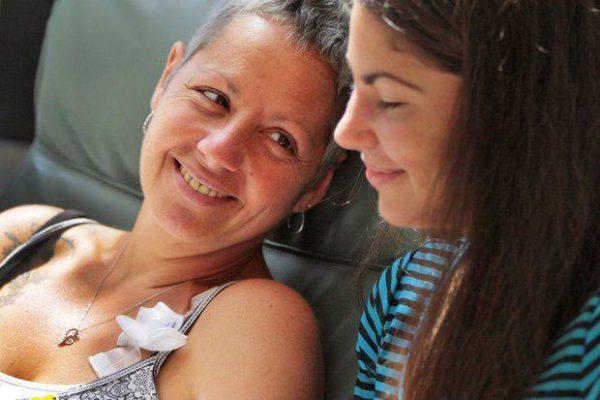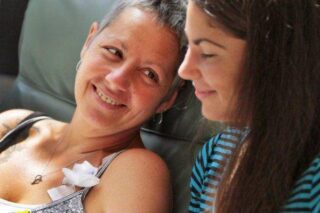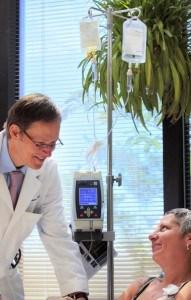Lung cancer treatment using patients’ immune system shows promise

By Martta Kelly | Special to The Star-Ledger

Lung cancer patient Daria Shepherd smiles as she looks at her daughter, Paige, Shepherd as Daria receives a new trial cancer treatment called Nivolumab at the Hunterdon Regional Cancer Center in Flemington. (Tony Kurdzuk/The Star-Ledger)
A routine ultrasound last year turned out to be something much more sinister for Daria Shepherd of Kingwood Township.
“I had this pain in my right side and I thought it was just the result of overdoing it,” said the active 47-year-old mother of two who enjoys jogging regularly with her 22-year-old daughter.
When her blood tests came back normal and physical therapy didn’t seem to be helping, her doctor ordered the ultrasound.
Shepherd wasn’t prepared for what came next.
The ultrasound showed not only a benign cyst on her right ovary but spots on her lung as well. A subsequent chest scan and biopsy determined the spots indicated advanced lung cancer.
Shepherd started chemotherapy, but it proved to be ineffective for her type of cancer. Her doctor, Myron E. Bednar, medical oncologist at Hunterdon Regional Cancer Center in Flemington, suggested she enroll in a clinical trial for a new drug called Nivolumab, which works with the patient’s own immune system to attack cancer cells. In addition, the drug doesn’t have the debilitating side effects of traditional chemotherapy, such as nausea, fatigue and hair loss.

Lung cancer, according to the American Cancer Society, is the second most common cancer among men and women and the leading cause of death in the United States. It is estimated that this year, more than 224,000 people will be diagnosed with lung cancer.
HRCC was selected as the only cancer facility in New Jersey to offer a clinical study on Nivolumab, which is made by Bristol-Myers Squibb. The closest facility outside the tri-state area is in Tennessee. There are currently eight people in the clinical trial at HRCC.
To be eligible for the clinical trial, patients must have been diagnosed with advanced stage lung cancer and have undergone at least one therapy prior to entering the trial, Bednar said.
Nivolumab works by blocking a molecule called PD-L1, found in many cancer cells, from binding to a protein called PD-1, found on the surface of T-cells, known as the “fighter cells” of the immune system, said Kenneth B. Blankstein, an oncologist at HRCC.
If PD-L1 is allowed to bind to PD-1, T-cells become ineffective, Blankstein explained. This is how cancer cells are able to disarm T-cells and inhibit them from attacking the tumor. Since PD-1 blockers free up the immune system only around the tumor rather than throughout the whole body, they also have fewer side effects than chemotherapy.
“Drugs such as Nivolumab that inhibit PD-1 may also be able to treat a variety of cancers, including melanoma, which is very exciting.” Blankstein added.
Both Bednar and Blankstein stressed that while Nivolumab, like chemotherapy, is not a cure, it appears to improve the overall survival of cancer patients.
“We’re are optimistic about the results of the trial so far,” Bednar said. “We’ve had a 30 percent response rate, which, in this group, is significant.”
To date, Shepherd has had three infusion treatments and feels wonderful. She is scheduled to have a CAT scan every eight weeks to see how things are responding. “I have not had any side effects whatsoever,” she said. “I have been able to go on with my life and to do the things I love, such as fishing and jogging.”
Anyone interested in becoming part of this clinical trial should call Hunterdon Regional Cancer Center, (908)-788-6461, and ask to speak with Kathy Robbins, a clinical research nurse. If it is determined that you are eligible, she will set up an appointment with one of center’s four oncologists.

